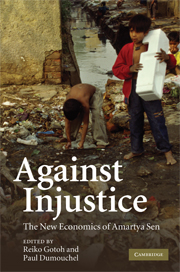Book contents
- Frontmatter
- Contents
- List of figures
- List of tables
- List of contributors
- Acknowledgements
- Introduction
- Part I
- Part II
- Part III
- 10 On applying synthetic indices of multidimensional well-being: health and income inequalities in France, Germany, Italy, and the United Kingdom
- 11 Assessing children's capabilities: operationalizing metrics for evaluating music programs with poor children in Brazilian primary schools
- 12 The search for socially sustainable development: conceptual and methodological issues
- 13 Part IV
- Index
- References
12 - The search for socially sustainable development: conceptual and methodological issues
Published online by Cambridge University Press: 18 January 2010
- Frontmatter
- Contents
- List of figures
- List of tables
- List of contributors
- Acknowledgements
- Introduction
- Part I
- Part II
- Part III
- 10 On applying synthetic indices of multidimensional well-being: health and income inequalities in France, Germany, Italy, and the United Kingdom
- 11 Assessing children's capabilities: operationalizing metrics for evaluating music programs with poor children in Brazilian primary schools
- 12 The search for socially sustainable development: conceptual and methodological issues
- 13 Part IV
- Index
- References
Summary
Introduction
Interest in the concept of ‘socially sustainable development’ proceeds from two different lines of thought which became important in the 1990s. The first of these focuses on the idea of sustainable development, and the second on the issue of reducing poverty.
The idea of ‘sustainable development’ was widely publicized by the 1992 Earth Summit, held in Rio de Janeiro. It is derived from the Brundtland report, ‘Our Common Future’, published a few years earlier. Development is said to be sustainable when it meets the needs of the present without compromising the ability of future generations to meet their own needs (WCED 1987).
This implies that the process of development will improve the well-being of people now alive, while maintaining a sufficient level of resources – especially non-renewable resources, whether natural, social or human – to permit future generations to enjoy at least an equivalent standard of living. This issue is now viewed as a serious matter by many governments and civil agencies. It demands that we take into account not only the objectives and outcome of development, but also address the method and process by which development is achieved.
Several key decisions taken during the Earth Summit, including the launching of Agenda 21, recommend the implementation of measures to protect the environment at the regional, national and local levels. Agenda 21 also encourages the development of multidisciplinary research to analyze the interactions between the various dimensions of sustainable development.
- Type
- Chapter
- Information
- Against InjusticeThe New Economics of Amartya Sen, pp. 275 - 294Publisher: Cambridge University PressPrint publication year: 2009
References
- 4
- Cited by



